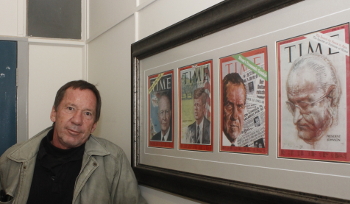Latest News Archive
Please select Category, Year, and then Month to display items
13 December 2024
|
Story Anthony Mthembu
|
Photo Charl Devenish
 Lieutenant Colonel Dr Rifa Tshivhase, Head of the Department of Surgery at 3 Military Hospital in Bloemfontein, addressed graduates within the Faculty of Health Sciences at the University of the Free State on 10 December 2024.
Lieutenant Colonel Dr Rifa Tshivhase, Head of the Department of Surgery at 3 Military Hospital in Bloemfontein, addressed graduates within the Faculty of Health Sciences at the University of the Free State on 10 December 2024.
Momentous and joyous – these are some of the words used to describe the December 2024 graduations at the University of the Free State (UFS). In celebration of the academic achievements of its students, the UFS hosted graduation ceremonies at the Callie Human Centre on its Bloemfontein Campus from 9 to 10 December 2024.
Prof Anthea Rhoda, acting Vice-Chancellor and Principal of the UFS, encouraged the graduates to always acknowledge and recognise the significance of this achievement as they transition from being UFS students to being UFS graduates.
Undergraduate and postgraduate achievements
At least 2000 undergraduate qualifications and postgraduate qualifications were conferred. As such, there were some standout academic achievements across the sessions. For instance, Itumeleng Pooe received his Advanced Diploma in Theology cum laude, making him the only graduate in the Faculty of Theology and Religion to receive his qualification with distinction during these graduations. In addition, Dr Bobuin Jr Valey Gemandze Oben – at just 28 years old – was the youngest PhD graduate from the Faculty of Law at the graduation ceremony, which took place on the morning of 9 December 2024.
Conferring Honorary Doctorates
Some highlights from these graduations were the recipients of honorary doctorates, as well as the keynote speakers. The Faculty of Economic and Management Sciences (EMS) at the UFS conferred an honorary degree on Prof Murray Leibbrandt, Research Chair in Poverty and Inequality Research in the Southern Africa Labour and Development Research Unit (SALDRU) at the University of Cape Town (UCT). In addition, the Faculty of The Humanities at the UFS conferred an honorary degree on HE Bineta Diop, Special Envoy of the Chairperson of the African Union Commission on Women, Peace, and Security.
On the final day of the graduations, graduates within the Faculty of Health Sciences at the UFS were addressed by Lieutenant Colonel Dr Rifa Tshivhase, Head of the Department of Surgery at 3 Military Hospital in Bloemfontein. In her address, Lieutenant Colonel Dr Tshivhase encouraged and challenged the graduates to actively seek out good in the world.
As the December 2024 graduations concluded, several of the graduates within the Faculty of Health Sciences indicated that the most memorable moments in the session were the cheers and applause they received as they walked across the stage.
Photo manipulation in journalism: evil, crutch or lifebuoy?
2017-09-04

Albe Grobbelaar, veteran journalist and lecturer in the
Department of Communication Science at the UFS.
Photo: Rulanzen Martin
Since the 1800s the manipulation of photographs has been common practice, and who can forget the OJ Simpson Time magazine cover in 1994? Albe Grobbelaar, lecturer in the Department of Communication Science at the University of the Free State (UFS), asked in a special lecture on 18 August 2017 whether “Photo manipulation in Journalism” was an evil habit, a crutch or a lifebuoy.
“As a journalist I have always been interested in photography. And the principle of photo manipulation or tampering with photos, as we call it, is something that has interested me ever since,” Grobbelaar said. Photo manipulation is an area that has garnered many academic interest and is not a new trend but a practice that started in the 1830s when photos came into popular use. “It is not always done with ulterior motives, artists played with photographs to get unique effects.” Photo manipulation is not only to create fake news, but is sometimes used to convey novelty and create shock to news readers.
Different viewpoints for different circumstances
He talked about the spectrum of viewpoints on photo manipulation. Some conservative journalism schools say photos should never be retouched while other feel it is fine to tamper with pictures. “What I tried to convey in the lecture was that one should consider different circumstances differently,” Grobbelaar said. As a journalist he believes that news photos should never be manipulated.
He mentioned the example of the mugshot of OJ Simpson that the Los Angeles Police Department released to the media. “Newsweek and Time both used the photo on their front pages, but Time deliberately darkened the picture so that OJ, a black man, would appear more sinister,” Grobbelaar said. It is, however, common practice in the fashion industry to retouch images that are used in fashion magazines.
Use own judgment to validate photos
In the age of social media it has become easy to manipulate photos and which has been labelled fake news. “I would advise people to use their own judgment when validating the authenticity of photos,” Grobbelaar said. It is important to verify whether they are from a reliable news outlet.